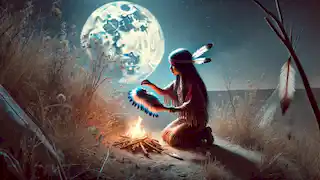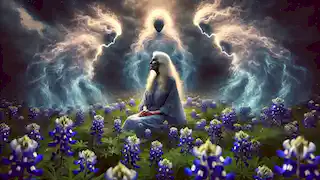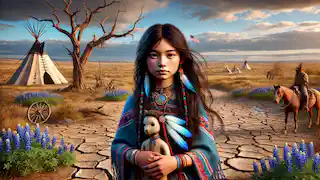Long ago, before the bustling cities and highways existed, when the land was wild, and nature reigned supreme, there were vast expanses of untamed wilderness that stretched across what we now know as the state of Texas. In this land of rolling hills, deep valleys, and wide-open plains, a proud and noble tribe lived. This tribe, known as the Comanche, thrived in harmony with the earth and sky, understanding the rhythms of nature and the spirit of all living things. They were wise and respectful, taking only what they needed from the land and giving back whenever they could.
This story is about a little girl named She-Who-Is-Alone, a name given to her because she had no family left. Her parents and brother had perished during a great drought that had struck the land, leaving the Comanche people in despair. The land had become parched, the rivers had dried up, and the animals that the tribe relied upon had disappeared. The crops withered, and the people grew weaker with each passing day. In their suffering, the elders of the tribe called upon the Great Spirits for help, praying for rain to save them. But no rain came, and the earth remained dry and cracked.
It was in these dark times that the true meaning of sacrifice and the spirit of selflessness would come to light through the actions of a single, brave child. This is the story of how the bluebonnets, the vibrant blue flowers that now bloom across Texas every spring, came to be – a story of courage, sacrifice, and love. The tribe's greatest fear had come to pass: an unyielding drought had descended upon the land. Each day, the sun grew hotter, baking the earth until it was as hard as stone. The people began to suffer greatly, and their animals weakened and perished. The crops failed, and hunger gnawed at their bellies. Desperation clung to them like a shadow. One evening, as the tribe gathered around their dying fires, the oldest elder, Grandmother Tall Pine, spoke. "We have angered the Great Spirits," she said in a voice that trembled with age. "They require a sacrifice from us, a great offering to show our devotion and our willingness to give up that which we cherish most." She-Who-Is-Alone sat quietly at the edge of the circle, clutching a small doll to her chest. This doll was the only thing she had left from her family, crafted by her mother and adorned with blue feathers from a rare bird that her father had hunted. The doll's hair was made of fine horsehair, and its eyes were bright beads that sparkled in the firelight. It was her most cherished possession, a symbol of her lost family, and the one thing that brought her comfort in the lonely nights. The people began to murmur among themselves, wondering what they could offer to appease the Great Spirits. Grandmother Tall Pine's voice rose again. "The Spirits will accept nothing less than the most precious item we each possess. Only then will they know our hearts are sincere." She-Who-Is-Alone listened to the words of the elder, her small heart aching. The thought of giving up her doll was more painful than anything she could imagine. Yet, as she looked around at her people – her tribe – she saw the despair in their eyes and the suffering etched into their faces. She made a decision. That night, when the moon was full, she crept out of her family's tent and climbed to the top of a hill outside the village. She-Who-Is-Alone stood on the hilltop, gazing up at the moon, the stars shining like tiny sparks against the velvet sky. Clutching her doll one last time, she took a deep breath and said, "Great Spirits, this is my most cherished possession. It is all I have left of my family, but I give it to you. Please, please bring rain to save my people." With tears streaming down her face, she placed the doll on a bed of dry grass and twigs. She lit a small fire with the flint her father had taught her to use, and the flames flickered to life, slowly consuming the doll. As the smoke rose into the night sky, She-Who-Is-Alone felt a sense of peace wash over her. The sacrifice was made. The next morning, when the tribe awoke, they saw that the sky had turned gray, and clouds had begun to gather. A cool wind blew across the land, and the scent of rain filled the air. By midday, raindrops began to fall, slowly at first, then harder and harder until the dry earth drank deeply, and the rivers began to swell once more. The people rejoiced, their prayers finally answered. They danced in the rain, their voices raised in gratitude to the Great Spirits. When the rain finally stopped, and the sun broke through the clouds, the people looked out over the hills. There, where She-Who-Is-Alone had made her offering, a blanket of vibrant blue flowers had bloomed. The flowers stretched as far as the eye could see, their petals shimmering in the sunlight like drops of water. The tribe had never seen such beauty before, and they knew that the Great Spirits had accepted the little girl's sacrifice. They named the flowers "bluebonnets," for they looked like the bonnets the women of the tribe wore. The bluebonnets flourished across the land, and each spring, they would bloom again, reminding the tribe of the great sacrifice made by one so young. The elders told the story of She-Who-Is-Alone to every child in the tribe, teaching them the importance of selflessness and love for their people. The legend of the bluebonnet became a story passed down through generations, each one retelling it with reverence and respect. Years passed, and She-Who-Is-Alone grew into a strong, wise woman. She became known as She-Who-Brings-Flowers, for wherever she walked, the bluebonnets seemed to bloom more brilliantly. She led her people with kindness and courage, always remembering that the true strength of a person lay in their willingness to give of themselves for the good of others. And so, the land of Texas was forever blessed with the beauty of the bluebonnet, a symbol of sacrifice and renewal. The bluebonnets served as a reminder that even the smallest and seemingly insignificant among us could create a ripple that would touch many lives. As years went by, the story of She-Who-Is-Alone reached other tribes and settlers who had begun to move into the region. They, too, marveled at the sea of blue that spread across the hills each spring. The settlers came to respect the Comanche people and the lesson of the bluebonnets, understanding that they stood for more than just beauty – they were a symbol of hope, sacrifice, and the enduring spirit of humanity. One year, when She-Who-Brings-Flowers was old and her hair had turned white, she climbed the same hill where she had made her offering as a child. She sat down among the bluebonnets, feeling their soft petals brush against her skin. The sky grew dark, and a sudden wind began to blow. Looking up, she saw the Great Spirits in the clouds, their forms shifting and changing, like smoke in the wind. The Spirits spoke to her in a voice as deep as thunder, "You have honored us, child. Your sacrifice was not in vain. Because of you, the land will always remember, and the bluebonnets will bloom as a reminder of the strength and love that live within all people." Tears filled the old woman's eyes, but they were not tears of sadness. They were tears of joy and fulfillment, for she knew that her life's journey had been meaningful. As she sat there, surrounded by the flowers, she felt herself becoming lighter, as if she were turning into one of the petals. And then, as the wind picked up, she faded away, becoming one with the bluebonnets that she had brought to life. To this day, every spring, the hills of Texas come alive with the bluebonnets. People from all walks of life come to see them, to marvel at their beauty, and to hear the story of the little girl who gave everything for her people. They say that if you stand among the bluebonnets on a quiet morning and listen closely, you can still hear the voice of She-Who-Is-Alone carried on the wind, whispering words of love and sacrifice. And so, the legend lives on, a story that will be told for generations to come. It is said that those who pick a bluebonnet will find a small feather within its petals, a reminder of the doll that was sacrificed long ago. The bluebonnet is more than just a flower; it is a symbol of hope, love, and the enduring power of selflessness that resides within us all. As long as the bluebonnets bloom, the spirit of She-Who-Is-Alone will never be forgotten, and her story will continue to inspire those who walk among the flowers. The land that was once parched and lifeless now bursts with life each year, a testament to the strength of a single act of kindness and the beauty that can arise from even the darkest of times. And so, when you see the bluebonnets blooming, remember the little girl who gave everything she had, and let her story remind you that even the smallest among us can make a difference. {{{_04}}}The Drought and the Sacrifice

The Offering to the Spirits

The Flower that Tells a Story
The Return of the Spirits

Epilogue: The Endless Bloom


















